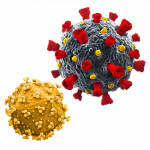In the fall of 2009, researchers at a lab in Reno, Nevada, said they detected a potentially transmissible virus in the blood of people with myalgic encephalomyelitis (ME). The study led the American Red Cross to ban blood donations from people with ME. The study was retracted in 2011 and the Red Cross guideline was later reversed, but more than a decade later, there is still a lifetime ban on blood donation from people with ME in the U.K. by the National Health Service (NHS).
Similar ME donor bans are also active today in Australia, New Zealand, Ireland, and Canada. The Canadian Blood Service and the Australian Red Cross both state that ME could be caused by a “transmissible” infection. More questions began to emerge about blood donation by members of the chronic illness community in 2022 when the NHS updated their eligibility requirements, deferring people with long COVID from donating blood until they considered themselves “fully recovered.” Their reasoning? They stated that blood donation could worsen the symptoms of people with long COVID or ME.
Leading long COVID and ME researchers and patient-advocates who spoke with The Sick Times largely agreed that blood donation could worsen a patient’s symptoms. However, they also cited concerns about a growing body of research that shows a variety of potential issues in the blood of people with long COVID which could make their blood unsafe for recipients.
“Based on the levels of inflammatory markers and microclots we have seen in blood samples from both long COVID and ME/CFS, I do not think the blood is safe to be used for transfusion,” said Resia Pretorius, a leading long COVID researcher and distinguished professor from the physiological sciences department at Stellenbosch University in South Africa.
Scientists and advocates also called out the NHS and other Western health agencies for their inconsistent blood donation guidelines, saying that these agencies aren’t properly investigating the safety of the already-stressed blood supply during the continuing SARS-CoV-2 pandemic. They say government health organizations should be urgently supporting diagnostic tests and treatments for long COVID.
Some advocates worried that decisions like the NHS’s — without more transparency about why they defer donations from people with long COVID — could also increase stigma against patients.
The American Red Cross and U.S. Centers for Disease Control and Prevention (CDC) did not respond to a list of questions sent over email, referring The Sick Times instead to the Food and Drug Administration (FDA). The FDA did not immediately respond to a list of questions; it referred me to the Health Resources and Services Administration (HRSA) for questions about organ donation and has not responded to other questions at time of publication. HRSA simply shared that “people who have recovered from COVID-19 infection can be organ donors.”
The U.K.’s guidelines on long COVID blood donation
The NHS’s current policy states that people with long COVID are not eligible to donate blood but can donate six months after “all symptoms have gone,” in contrast to the agency’s life ban on ME and post-viral fatigue syndrome. Other countries including the U.S., Canada, and Australia don’t have specific guidelines for long COVID, but generally state that donors should feel well and meet other eligibility requirements when donating.
“These [inconsistent guidelines] reflect our degree of uncertainty about these diseases,” said Jaime Seltzer, the scientific director at #MEAction. It’s commonsense information to not give blood if you aren’t feeling well, Seltzer added, explaining that this guidance is the best these institutions can do right now. “But it shows that there is a serious need for additional investment in research,” she said.
The NHS did not answer a set of emailed questions about the specifics of donation eligibility for long COVID but referred me to U.K. transfusion guidelines about COVID-19 and blood donation. The guidelines state people with long COVID “must not donate,” while clarifying that this is precautionary because “there is no evidence at present that coronaviruses can be transmitted by blood transfusion.”
Banning blood donations from people with long COVID is “sensible” given evidence that people with the disease have a dysfunction that could be transmitted to others who might receive donated blood or blood products, said Charles Shepherd, the medical advisor of the U.K. charity the ME Association.
Until we know more about long COVID, bans on blood donations should continue for long COVID and ME, Shepherd said. In addition, he pointed to concerns for donor safety: “Donors giving blood from either illness could also result in an exacerbation of their symptoms.”
The NHS’s main reason for deferring blood donations from people with long COVID was that they could experience an “increased risk of side effects from donation,” according to documents shared with The Sick Times from a U.K. public records request.
The agency also stated that people with ME are not able to donate for life because it is a relapsing disease — but that people with long COVID can donate once they are “fully recovered.” Patients and experts pointed out these contrasting guidelines, citing studies and lived experience that show many people with long COVID experience ME-like relapses. The NHS does not have any guidelines for dysautonomia or mast cell activation syndrome — both commonly diagnosed alongside long COVID and ME — but said it expects donors to feel “well” on the day of donation.
“[The NHS] seems to be completely oblivious to the biomedical science,” said Shaney Wright, who lives in the U.K. and filed the public records request. He attributes the agency’s inconsistencies to a bureaucratic decision to limit blood donations from people with long COVID without properly investigating the vast scientific literature on long COVID, ME, and related conditions.
What we know about the blood of people with long COVID
Over the past four years, scientists have discovered a range of abnormalities in the blood of people with long COVID. According to a 2023 review in Frontiers in Physiology, these include alterations in red blood cells, elevated levels of inflammatory markers, and lymphopenia (when the blood doesn’t have enough white blood cells).
Recent research has also found iron dysregulation, or “anemia of chronic disease,” is associated with long COVID. This condition, which emerges after a person experiences various inflammatory diseases, involves lowered red blood cell count and hemoglobin — resulting in less oxygen. Another recent study found persistent SARS-CoV-2 virus in the blood plasma of people with long COVID (pwLC).
Since 2021, researcher Resia Pretorius has led a series of studies describing “microclots” in long COVID patients. These misfolded fibrinogen proteins entrap numerous inflammatory molecules and antibodies and break down slowly because they are fibrinolytic-resistant — meaning the bundles are hard to get rid of.
Pretorius hypothesizes that lingering SARS-CoV-2 spike proteins and other inflammatory molecules in the blood flow lead to these misfolded proteins, which can clog blood vessels and prevent oxygen from reaching organs, including the brain. They may also be involved in widespread endothelial damage, a type of coronary artery disease that causes arteries to narrow. Pretorius and her collaborators have also found microclots in the blood samples of people with ME.
“Individuals with both ME/CFS and long COVID probably have compromised red blood cell function,” Pretorius said. The people who receive blood transfusions are often vulnerable from surgery or trauma and need to have optimally functioning red blood cells from donors — which many with long COVID or ME likely aren’t able to provide, she said.
Despite these important findings, there still isn’t a standardized laboratory method or diagnostic tests available to test the blood of people with long COVID before or after blood donation, like the tests that are used to screen potential donors for HIV, Zika, Hepatitis, and other common diseases. There might be individuals who have long COVID who don’t recognize that they even have the disease, Pretorius said, “due to the lack of diagnosis or sometimes even the lack of recognition of symptoms due to a previous SARS-CoV-2 infection.”
David Putrino, a long COVID researcher and Director of Rehabilitation Innovation at Mount Sinai Health System in New York, is currently leading a clinical trial to better understand and potentially treat microclots. The trial uses an over-the-counter supplement called lumbrokinase that may break down the fibrinogen bundles.
Plasma from people with long COVID, in particular, should not be used for donation, Putrino said. One leading long COVID theory is that patients’ bodies produce functional autoantibodies, which are immune proteins that mistakenly target a person’s own organs and tissues. This production could happen alongside other biological issues like viral persistence in some people with long COVID, while others may not have autoantibodies, Putrino said.
“[These] autoantibodies can be transmitted in plasma,” he said. “As a result, if you’re donating plasma and you have long COVID, there’s a chance that you’re also passing along functional autoantibodies that could be damaging to the recipient of your plasma.”
Since long COVID affects millions worldwide and rates of the disease continue to rise, Putrino worries about how COVID-19 and long COVID may limit the blood supply, especially when organizations like the American Red Cross are already facing an emergency blood shortage. “It’s something that keeps me up at night.”
Four years into the pandemic, it is alarming that we still don’t have complete answers about the effects of SARS-CoV-2, Putrino said. Many institutions aren’t studying the problem — including blood and organ donations — with the urgency they should. “These are all very concerning questions and once again, sticking our head in the sand is not a strategy,” he said.
Stigma, implications, and inconsistencies
When the NHS announced that it deferred people with long COVID from donating blood, many people with the disease pointed out the policy was inconsistent with the U.K. government’s lack of urgency in addressing the long COVID crisis. The government has largely failed to fund meaningful research, support people with the illness, or prevent more cases of COVID-19, much like in the United States.
The U.K. government’s neglect of both long COVID and ME has led to increased stigma, especially as government agencies have minimized these diseases and implied through promoting treatments like graded exercise therapy that leaders believe both are psychological illnesses. Advocate Sally Callow wrote in July 2022, “If [the NHS thinks] ME is a psychological illness, why are we not allowed to give blood in the UK?”
Inconsistencies and lack of transparency at the NHS fit a broader pattern of governments minimizing long COVID and ME, said Gabriel San Emeterio, co-founder of the U.S. advocacy group Long COVID Justice. Many government agencies tend to downplay or psychologize long COVID and ME when it is politically and financially convenient for them, particularly when denying social supports, disability benefits, and COVID-19 prevention measures, they said.
“Rather than allocating money for research or giving resources to people with long COVID — [which they would do] if they really are concerned about the donor — they ban these people from donating,” San Emeterio said. As a longtime HIV advocate, San Emeterio has observed how blanket blood donation bans for men who have sex with men have contributed to society’s shaming of queer men.
“Many blood bans have been based on stigma, not science,” they said. “Hopefully, the people making these decisions going forward will realize that they also need messaging that helps combat the stigma [of long COVID] that they could be bringing on.” Like other experts, San Emeterio recommends clear, consistent guidelines, a greater urgency in researching long COVID and ME, and supporting people with the disease.
“Why do some still not take the disease seriously enough to have proper treatment facilities and funding to try to help the individuals with the disease?” Pretorius asked. “Especially if they claim to be concerned about them?”
Key points you should know:
- Based on the current science, the blood and plasma of people with long COVID should not be used for donation, agreed leading long COVID experts who spoke with The Sick Times.
- People with long COVID are currently not allowed to donate blood in the U.K. by the National Health Service until they self-report being “fully recovered.” The NHS, like other blood donation organizations, states that all donors should feel well on the day of donation.
- There are many inconsistencies in blood donation guidelines around the world. Some countries state people with ME and post-viral fatigue syndrome are ineligible to donate for life, even if they recover, contrasting the NHS’s guidelines on long COVID. Most don’t have any guidelines for Long Covid or related diseases, but state donors should feel “well” on the day of donation.
- Public health agencies need to be considerate and clear in their decision-making processes and how they communicate about blood donation guidelines so as not to increase stigma.
- Questions arise about global blood supply, given that so many people have had COVID-19 and many are unaware they may have long COVID. We need diagnostic testing to determine which blood is safe for donation.
This article was published by The Sick Times, a website chronicling the long COVID crisis, on May 14, 2024. It is republished with permission.







Comments
Comments